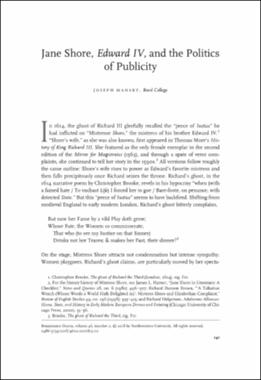| dc.contributor.author | Mansky, Joseph | |
| dc.date.accessioned | 2020-10-21T16:32:49Z | |
| dc.date.available | 2020-10-21T16:32:49Z | |
| dc.date.issued | 2018 | |
| dc.identifier.citation | Mansky, Joseph. Jane Shore, Edward IV, and the Politics of Publicity. Renaissance Drama 46.2 (2018): 141–65. | en_US |
| dc.identifier.uri | https://hdl.handle.net/11244/325620 | |
| dc.description.abstract | This essay sketches the publics imagined and instantiated by Thomas Heywood's two-part history play Edward IV. Heywood’s play locates the middle-class woman Jane Shore at the center of public politics, turning the cautionary tale of “Mistress Shore” (King Edward’s favorite mistress) into the populist story of “Jane Shore,” champion of the commons and innocent victim of Richard III’s tyranny. As a commoner and a woman, Jane Shore models an emergent politics of publicity through which ordinary people, no less than princes and politicians, could fashion public identities and participate in political life. Richard’s propaganda proves to be no match for Jane’s enduring popularity. Even as the tyrant reduces her to abject poverty, he completely fails to dislodge her from the people’s hearts. Her fall instead catalyzes a community of resistance: the affective attachments of ordinary people generate a counterpublic of commiserating citizens in the play—and in Heywood’s theater. | en_US |
| dc.language | en_US | en_US |
| dc.subject | Edward IV | en_US |
| dc.subject | Jane Shore | en_US |
| dc.subject | Renaissance Drama | en_US |
| dc.subject | Elizabethan drama | en_US |
| dc.subject | Thomas Heywood | en_US |
| dc.title | Jane Shore, Edward IV, and the Politics of Publicity | en_US |
| dc.type | Article | en_US |
| dc.description.peerreview | Yes | en_US |
| dc.identifier.doi | 10.1086/699621 | en_US |
| ou.group | College of Arts and Sciences::Department of English | en_US |
